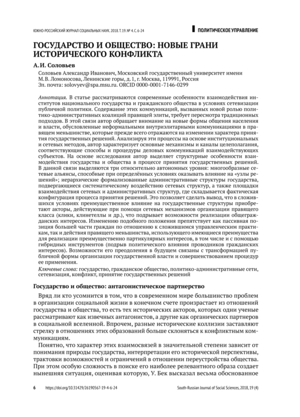Abstract
The author analyzes present-day characteristics of cooperation of national state and civil society institutions, now that public politics went into social networks. This type of communication, caused by the new role of politico-administrative coalitions of the ruling elite, requires the revision of traditional approaches in many respects. In this connection, the author draws the readers’ attention to new forms of dialogue between the people and the governance caused by informal communication among the elite in the ruling minority; these informal communications affect the nature of decision-making on the state level. While analyzing these processes on the basis of institutional and networking methods, the author characterizes the basic mechanisms and the channels of goal-setting, the respective ways and proceedings of business communication of interactive individuals. On the basis of his research, the author singles out structural characteristics of cooperation between the state and the society indecision-making on the state level. It follows that there exist three relatively independent levels: diversified network coalitions that can, under certain circumstances, influence centres of decision-making; hierarchic formalized state governance structures exposed to permanent pressure on the part of networking, and administrative structures where the configuration of decision-making process takes place as it is.It means that under existing conditions the predominant influence upon state structures is exercised by actors who operate through networking mechanisms of the ruling class organizations (clicks, clientele, etc.) which fact undermines the possibility to realize common interests. Changing the state of things obstructed both by the passive stand of the majority of citizens concerning well-established) governance practices and the actions of the ruling minority who use their advantages to realize their own interests with the help of hybrid interests (disruption of political influence of the messengers of civil interests) The possibilities to overcome this obstruction in future depend on the transformation of the public form of state power organization and on the improvement of its application proceedings.
Keywords
References
Алексеева, Т.А. (2017). Политические науки на фоне меняющихся картин мира. В А.И. Соловьев (ред.). Политическая рефлексия, теория и методология научных исследований (с. 48–64). Москва: РОССПЭН.
Барсукова, С.Ю. (2015). Эссе о неформальной экономике, или 16 оттенков серого. Москва: Издательский дом ВШЭ.
Бурдье, П. (2017). О государстве. Москва: Издательский дом Дело.
Ильин, М., Кудряшова, И. (ред.). (2008). Суверенитет: трансформация понятий и практик. Москва: МГИМО-Университет.
Кастельс, М. (2016). Власть коммуникации. Москва: Издательский дом ВШЭ.
Курочкин, А.В. (2011). Политика в условиях сетевого общества: новая структура и содержание. Исторические, философские, политические и юридические науки, культурология и искусствоведение. Вопросы теории и практики, 3, 113–119.
Малинова О.В. (2015). Конструирование смыслов. Исследование символической политики в современной России. Москва: ИНИОН.
Малинова, О.Ю. (2012). Символическая политика. Контуры проблемного поля. В О.Ю. Малинова (ред.) Символическая политика. Конструирование представлений о прошлом как властный ресурс. Вып. 1 (с. 5–16). Москва: Издательство ИНИОН.
Мельвиль, А.Ю. (2013). Зачем «царю горы» хорошие институты? Политическая наука, 3, 166–167.
Нисневич, Ю.А. (2012). Государство ХХIII века: тенденции и проблемы развития. Москва: КноРус.
Норт, Д. (1997). Институты, институциональные изменения и функционирование экономики. Москва: Фонд экономической книги «Начала».
Панов, П.В. (2006). Институционализм рационального выбора: потенциал и пределы возможностей. В С.В. Патрушев (ред.) Институциональная политология (с. 43–92). Москва: ИСП РАН.
Тоффлер, Э. (2004). Третья волна. Москва: Издательство ACT.
Хайоз, Н. (2013). Управление, коррупция и локальные структуры политического влияния в Швейцарии. В О.В. Гаман-Голутвина (ред.) Элиты и общество в сравнительном измерении (с. 200–208). Москва: РОССПЭН. С. 200–208.
Baumgartner, F.R., Boef, S.L., Boydsun, A.E. (2008). The decline of the death penalty and the discovery of innocence. Cambridge: Cambridge univ. press.
Baumgartner, F.R., Green-Pedersen, C., Jones B.D., Mortensen, P., Neytenmans, M., Walgrave, S. (2009). Punctuated equilibrium in comparative perspective. American journal of political science, 53 (3), 602–619.
Baumgartner, F.R., Jones, B.D. (Eds.). (2002). Policy dynamics. Chicago, IL: Chicago univ. press, 2002.
Breunig, C. (2011). Reduction, Stasis, and Expansion of Budgets in Advanced Democracies. Comparative political studies, 44 (8), 1060–1088.
Brikland, Т. (1998). Focusing Events, Mobilization, and Agenda Setting. Journal of public policy, 18 (1), 53–74.
Collier, P. (2007). The Bottom Billion: Why the Poorest Countries Are Failing and What Can Be Done about It. Oxford; N.Y.: Oxford University Press.
Crozier, M., Thoenig, J.C. (1976). The Regulation of Complex Organized Systems. Administrative Science Quarterly, 2 (4), 547–570.
Dowding, K., Hindmoor, A., Iles, R., John, P. (2010). Policy agendas in Australian politics: The governor-general’s speeches, 1945–2008. Australian journal of political science, 45 (4), 533–557
Dupuy, F., Thoenig, J.C. (1985). L’Administration en miettes. P.: Le Seuil.
Grindle, M.S. (2007) Good Enough Governance Revisited. Development Policy Review, 25 (5), 533–574.
Ingram, H., Schneider A., Deleon, P. (2007). Social Construction and Policy Design, In P.A. Sabatier (Ed.) Theories of the Policy Process (pp. 93–124). Westview Press.
Ingram, H., Schneider, A. (2015). Making Distinctions: The Social Construction of Target Populations. In F. Fisher, D. Torgerson, A. Durnova, M. Orsini (Eds.) Handbook of Critical Policy Studies (259–273). Edward Elgar Publishing.
Musgrace, R.A. (1959). Theory of Public Finance. N.Y.: McGraw Hill.
Schneider, A., Ingram, Н. (1993). The Social Construction of Target Populations. American Political Science Review, 87 (2), 334–346
Silke, A., Kreisi, H. (2007). The Network Approach. In P.A. Sabatier (Ed.) Theories of the Policy Process (рр. 129–154). University of California, Davis: Westview Press.


